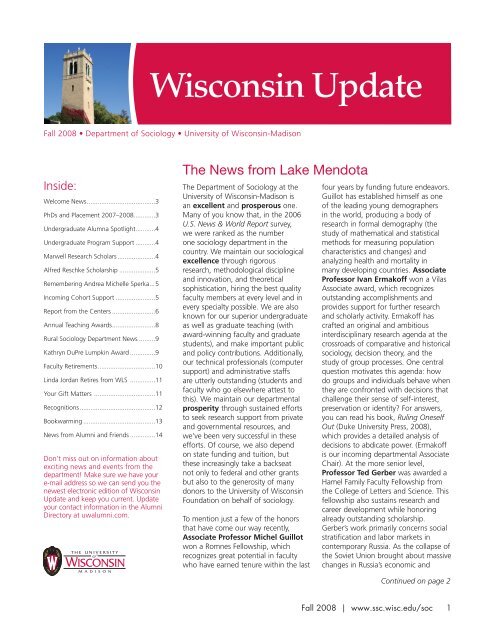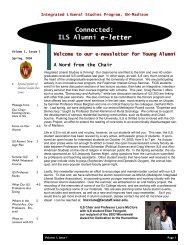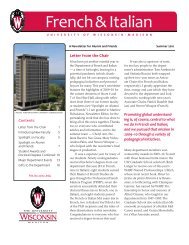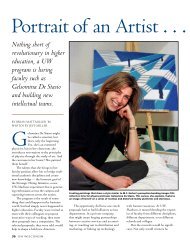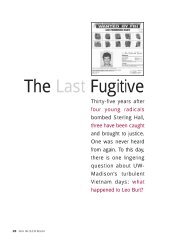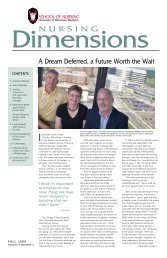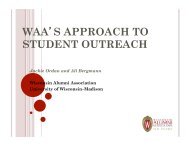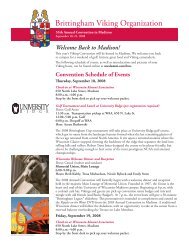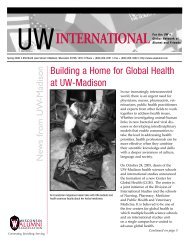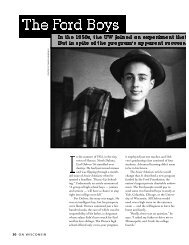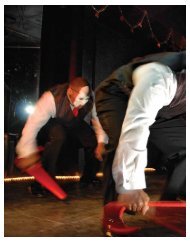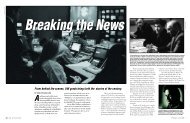Wisconsin Update - Wisconsin Alumni Association
Wisconsin Update - Wisconsin Alumni Association
Wisconsin Update - Wisconsin Alumni Association
You also want an ePaper? Increase the reach of your titles
YUMPU automatically turns print PDFs into web optimized ePapers that Google loves.
<strong>Wisconsin</strong> <strong>Update</strong>Fall 2008 • Department of Sociology • University of <strong>Wisconsin</strong>-MadisonInside:Welcome News......................................3PhDs and Placement 2007 –2008............3Undergraduate Alumna Spotlight...........4Undergraduate Program Support............4Marwell Research Scholars......................4Alfred Reschke Scholarship.....................5Remembering Andrea Michelle Sperka...5Incoming Cohort Support.......................5Report from the Centers.........................6Annual Teaching Awards........................8Rural Sociology Department News..........9Kathryn DuPre Lumpkin Award...............9Faculty Retirements................................10Linda Jordan Retires from WLS ...............11Your Gift Matters ..................................11Recognitions...........................................12Bookwarming.........................................13News from <strong>Alumni</strong> and Friends...............14Don’t miss out on information aboutexciting news and events from thedepartment! Make sure we have youre-mail address so we can send you thenewest electronic edition of <strong>Wisconsin</strong><strong>Update</strong> and keep you current. <strong>Update</strong>your contact information in the <strong>Alumni</strong>Directory at uwalumni.com.The News from Lake MendotaThe Department of Sociology at theUniversity of <strong>Wisconsin</strong>-Madison isan excellent and prosperous one.Many of you know that, in the 2006U.S. News & World Report survey,we were ranked as the numberone sociology department in thecountry. We maintain our sociologicalexcellence through rigorousresearch, methodological disciplineand innovation, and theoreticalsophistication, hiring the best qualityfaculty members at every level and inevery specialty possible. We are alsoknown for our superior undergraduateas well as graduate teaching (withaward-winning faculty and graduatestudents), and make important publicand policy contributions. Additionally,our technical professionals (computersupport) and administrative staffsare utterly outstanding (students andfaculty who go elsewhere attest tothis). We maintain our departmentalprosperity through sustained effortsto seek research support from privateand governmental resources, andwe’ve been very successful in theseefforts. Of course, we also dependon state funding and tuition, butthese increasingly take a backseatnot only to federal and other grantsbut also to the generosity of manydonors to the University of <strong>Wisconsin</strong>Foundation on behalf of sociology.To mention just a few of the honorsthat have come our way recently,Associate Professor Michel Guillotwon a Romnes Fellowship, whichrecognizes great potential in facultywho have earned tenure within the lastfour years by funding future endeavors.Guillot has established himself as oneof the leading young demographersin the world, producing a body ofresearch in formal demography (thestudy of mathematical and statisticalmethods for measuring populationcharacteristics and changes) andanalyzing health and mortality inmany developing countries. AssociateProfessor Ivan Ermakoff won a VilasAssociate award, which recognizesoutstanding accomplishments andprovides support for further researchand scholarly activity. Ermakoff hascrafted an original and ambitiousinterdisciplinary research agenda at thecrossroads of comparative and historicalsociology, decision theory, and thestudy of group processes. One centralquestion motivates this agenda: howdo groups and individuals behave whenthey are confronted with decisions thatchallenge their sense of self-interest,preservation or identity? For answers,you can read his book, Ruling OneselfOut (Duke University Press, 2008),which provides a detailed analysis ofdecisions to abdicate power. (Ermakoffis our incoming departmental AssociateChair). At the more senior level,Professor Ted Gerber was awarded aHamel Family Faculty Fellowship fromthe College of Letters and Science. Thisfellowship also sustains research andcareer development while honoringalready outstanding scholarship.Gerber’s work primarily concerns socialstratification and labor markets incontemporary Russia. As the collapse ofthe Soviet Union brought about massivechanges in Russia’s economic andContinued on page 2Fall 2008 | www.ssc.wisc.edu/soc 1
Welcome Newspolitical institutions, Gerber, applyingstate-of-the-art quantitative techniquesto survey data that he generated(with the assistance of major grants),leads the field in analyzing how thesechanges affected patterns of inequalityand the structure of labor markets.On top of these university awards, wetake pride in the wider professionalrecognition our faculty membersreceive. This year, at the annualmeetings of the American Sociological<strong>Association</strong>, the Social PsychologySection presented Professor EmeritaJane Piliavin with the Cooley-Meadaward. This honor is bestowed annuallyto an individual who has madelifetime contributions to distinguishedscholarship in sociological socialpsychology. In addition to receivingthe award, the recipient addressesthe Social Psychology section atthe annual American Sociological<strong>Association</strong> meetings. Jane, introducedby her former student Peter Calleroof Western Oregon University, gavea wonderful presentation at theAugust 2008 convention in Boston.Her presentation will be publishedas the lead article in an upcomingissue of Social Psychology Quarterly(along with Peter’s introduction).Additionally, Cora Marrett, currentlyon leave from our department to beAssistant Director for Education andHuman Resources at the NationalScience Foundation, is the recipientof the Cox-Johnson-Frazier award,for a lifetime of research, teaching,and service to the community in thetradition of these namesakes. Corautterly exemplifies this tradition. Asan accomplished teacher, researcher,administrator and program officer,Cora has been praised as anexceptionally powerful advocate forinclusion. She was recognized at theAwards Ceremony and PresidentialAddress at the Boston ASA meetings.All of these awards are highlycompetitive but, beyond thewell-deserved individual honors,indicate our overall excellence as adepartment. Yes, like the famouschildren denizens of Lake Wobegon,we are regarded — or at least regardourselves — as “all above average.”Excellence is cause for celebrationand, depending on the season,we had many this year, including a“bookwarming” party in Decemberwhen those who had publishedmonographs or edited volumes in thepast three years spoke briefly abouttheir books and then were feted withgood food and drink. There were 14books represented! You’ll find theircovers throughout this publication.A very special celebration was the 7thannual William H. Sewell MemorialLecture. When Bill Sewell (our formerchair and chancellor) passed awayin June 2001, he left us a legacy ofscholarly integrity and distinction.To honor his memory, we hold anannual lecture to demonstrate that thestandards Sewell established for ourdepartment remain intact and vibrant.A recently tenured faculty memberis asked to deliver the lecture andthis year that person was AssociateProfessor Giovanna Merli. Her talkwas entitled “Epidemiology, SocialSciences and the Spread of HIV/AIDSin China.” Merli’s Sewell lecture wasa most interesting and provocativeone, well attended and well received,after which there was a receptionfor informal appreciation. Merli,not incidentally, served as AssociateChair this past year, suggesting thatshe is a talented administrator aswell as scholar. She received a PhDin Demography from the Universityof Pennsylvania and, in addition tobeing a member of our faculty, isan affiliate with both the Centerfor Demography and Ecology andthe Center for East Asian Studies.Merli’s interests have centered on thedemography of China and SoutheastAsia, fertility and population policiesin Asia, and the global impact ofHIV/AIDS. Throughout her career,supported by major grants, Merli hasbeen involved in original quantitativeand qualitative data collectionefforts in international settings. Herearlier efforts yielded a series ofprominent articles published in majordemography and China studiesjournals, and her current effortsinvolving recent and forthcomingtrips to China are likely to leadto even more important researchcontributions along the lines that thetitle of her Sewell lecture highlights.Mentioning these award winners,our book publishing record, and ourcelebrations (including the Sewelllecture) should not detract from thewidespread achievements among ourmany faculty members at every level(assistant, associate, full professor)in research, teaching and service. Infact, one reason this department hashad its successes over the years isits strong orientation to the qualityand importance of the departmentas a whole. Dating famously fromthe early-Sewell era, and upheld bymany key figures subsequently, wehave developed a unique and strongculture that accords deep respect toour collectivity and the “commons” itsustains and by which it is sustained.As mentioned earlier, crucial partsof our collectivity include membersof the technical and administrativestaff, who form the indispensablesubstrate in particular ways for allthat we do. As you read furtherin this <strong>Update</strong> about new faces,accomplishments and transitions,we hope you keep the good of thecollectivity in mind, just as we do.— Doug MaynardConway-Bascom Professor and ChairWe are very happy to report that two new facultymembers will join our department in fall 2008.Marcia Carlson comes as an associate professorand Chaeyoon Lim joins the ranks of ouroutstanding assistant professors.Marcia Carlson received her PhDin sociology and demography fromthe University of Michigan in 1999,completed a postdoctoral fellowshipat Princeton University (Center forResearch on Child Well-being) from1999 to 2001 and, before comingto <strong>Wisconsin</strong>, was an AssociateProfessor of Social Work and Sociologyat Columbia University. Carlson’sprimary research interests center onthe links between family contextsand the well-being of children andparents. Her most recent work isfocused on fathers, the determinantsand consequences of father-childrelationships and the union contextsin which they develop, and on coparenting,union formation and couplerelationship quality among unmarriedparents. Her research agenda holdsgreat social significance. Her interestsin social policy issues predate hergraduate school research, with threePhDs and Placement 2007–2008years of work in Washington, D.C.,where she held congressional andagency staff positions. Her numerouspublished articles, book chapters andpolicy reports feature a consistentattention to policy issues and an abilityto communicate her work effectivelyto policy as well as scholarly audiences.Carlson’s research provides furtherstrength to scholarship on familydemography, especially family structureand processes in industrializedsocieties (a historical area of strengthin our department and one of theresearch trademarks of the Center forDemography and Ecology, which she isalso joining).Chaeyoon Lim received a PhD insociology from Harvard in 2007,followed by a postdoctoral fellowshipat the Saguaro Seminar at the KennedySchool of Government, HarvardUniversity. His research concerningShelley J. Boulianne — “Connecting, Informing, and MobilizingYouth and the Advantaged: The Role of the Internet inPolitical Engagement.” Pamela Oliver, Major Professor. On theJob Market.Gilbert Brenes — “The Effect of Early Life Events on the Burdenof Diabetes Mellitus among Costa Rican Elderly: Estimatesand Projections.” Alberto Palloni, Major Professor. AssistantProfessor, Universidad de Costa Rica, San Jose.Paul E. Lachelier — “Democracy, Individualism, and theCivil-Civic Citizen: Young Americans Talk about Community,Politics, and Citizenship.” Nina Eliasoph, Major Professor.Assistant Professor, Department of Sociology & Anthropology,Stetson University, Deland, Florida.interpersonal influence on politicalbehavior combines interests inpolitical sociology, social networks,social and organizational foundationsof democratic citizenship, andquantitative methods. Lim’s dissertationis a remarkable combination of clearlyelaborated theoretical questions andinnovative statistical analyses. Heexamines how people’s decisions toparticipate in political activities areinfluenced by their social contacts.Through the application of newor newly reappraised statisticalestimators, he artfully seeks to gaugethe causal effect of social networksand to shed light on its underlyingmechanisms. Lim’s current workfocuses on the effects of religioussocial networks on various civic andpolitical outcomes. He recently beganwork on a new project comparingthe relationship between formaleducation and democratic citizenshipin various countries, wherein he tries tounderstand whether formal educationmakes people better citizens. He willfind himself at home at <strong>Wisconsin</strong>,among its inspiring crowd of politicalsociologists, social movements andsocial networks scholars.Carolina Milesi Carmona — “Different Paths, DifferentDestinations: A Life Course Perspective on Educational Transitions.”Adam Gamoran, Major Professor. Postdoctoral Fellow,The Irving B. Harris Graduate School of Public Policy, Universityof Chicago.Jesse J. Norris — “Searching for Synergy: Governance,Welfare, and Law in Two EU Member States.” Jonathan Zeitlin,Major Professor. Jesse is pursuing a law degree atUW-Madison.2 Fall 2008 | www.ssc.wisc.edu/soc 3
Undergraduate Alumna SpotlightLuvella K. and Alfred Reschke Social Sciences FundErica Van Steen is a recent graduateof the Sociology Department whoreceived a BA with comprehensive honorsand was presented with the Dean’sDistinguished Honors Student of 2008award. During her time as an undergraduate,Van Steen pursued opportunitiesto conduct sociological researchregarding sex education and its impacton risky sexual behaviors, an interestthat complements the organizationshe founded and coordinates — theCoalition for Responsible Sex Education(CRSE). Van Steen’s interests in citizenship,social movements and ethnicityculminated in her undergraduatesenior thesis titled “Multiculturalism,Citizenship, and the Struggle for Representationin Democratic Societies.”She traveled to the United Kingdomand Israel to conduct her research forthe project.Van Steen has recently been acceptedinto the ASA’s Honors Program andpresented a paper about the fathers’rights movement at a roundtablesession this summer. She attends theLondon School of Economics andPolitical Science (LSE) as a master’scandidate in Social Policy Research.After obtaining her degree, Van Steenintends to work abroad for an NGOand later apply for a Fulbright grant tospend a year in Africa researching theimpact of foreign HIV/AIDS preventionpolicies upon particularly vulnerablepopulations. Still unsure of whethershe will apply for the internationalMBA program at the Université deUndergraduate Program Gets MAJOR Support!In 1995, on the occasion of JoannElder’s retirement, former students, colleaguesand friends created the JoannElder Sociology Scholarship Fund. Asthe first undergraduate student advisorin sociology, Elder expertly guidedstudents, helping them to fully benefitfrom their experiences within the departmentand on campus.Inspired by the outpouring of supportand honoring the commitment andcareer of Joe Elder, Professor of Sociology,Joann and Joe recently chose tomake a special gift in order to grow thefund and its impact on the exceptionalundergraduate students in the Departmentof Sociology.Genève or return to the U.S. as a PhDcandidate, Erica intends to continuetraveling and conducting cross-cultural,interdisciplinary research.Erica Van SteenIn tribute to Joann and Joe’s gift, thefund was renamed and is now knownas the Joann and Joe Elder UndergraduateFund in Sociology. Thefund will continue to support andprovide special opportunities for ourundergraduate students for generationsto come.The Reschke Scholarship honors thelate Alfred Reschke, a former studentand assistant in the Sociology Departmentat UW-Madison. It was endowedby a generous bequest from his wife,Luvella K. Reschke.The scholarship supports outstandingundergraduate students in theDepartment of Sociology. Up to fourscholarships of $2,000 each areawarded annually to students majoringin Sociology who have one or twosemesters of coursework remaining beforegraduation. To be considered fora Reschke Scholarship, students mustdemonstrate outstanding academicperformance at UW-Madison andfinancial need. According to the termsof the bequest, preference is given tostudents whose future plans includeteaching or working in the social sciences,social services or the ministry.2007–08 ReschkeScholarship AwardeesSteven DrakeDrake dove into sociological researchduring his first methods class and hasbeen eagerly acquiring research skillsever since. His writing sample camefrom the Computing in Social Scienceclass — the first one the Reschkecommittee has received. He hopes towork in sociological research onenvironmental issues.Matthew MinamiMinami served as a research assistantin the department and wrote his seniorhonors thesis this year. His thesis dealswith how integrating or not integratingsocially with white students affectsthe college experience for students ofcolor. In graduate school, he plans tofurther research race and education.Collin PaynePayne completed a 10-week summerResearch Experience for Undergraduatesprogram in Minority GroupDemography at the University of Texasat Austin. He presented his project atthe Southern Demographic <strong>Association</strong>last fall. With Professor Mark Suchman,he was also the recipient of a Hilldaleresearch award last year. He has beena member of the varsity rowing teamfor four years.Andrea SperkaAndrea Sperka tragically died in anauto accident in Botswana threemonths after being inducted to PhiBeta Kappa and four days after thescholarships were announced. ProfessorWilson was directing her honorsthesis. In addition to her studies, Andreaworked with homeless children inMadison, a homeless shelter in Duluthand in a shantytown in South Africa.Remembering AndreaMichelle SperkaThroughout her undergraduate years,Andrea carried a demanding academicschedule while working to help meether educational costs. In addition,Andrea often served as a volunteer,including her work with homelesschildren in Madison and in a townshipin South Africa.The Andrea Michelle Sperka Fund wasestablished by Carol and MichaelSperka in memory of their beloveddaughter. Andrea was a seniorwhen she tragically lost her life in anautomobile accident in Botswana aftercompleting her studies abroad.It is in Andrea’s spirit of helping othersthat Carol and Michael Sperka createdthis fitting tribute. Recipients of theAndrea Michelle Sperka Fund willexemplify the outstanding qualitiesthat Andrea possessed and will serveto keep the memory of this bright andtalented young woman alive.Marwell Research Scholars — Endowment for ExcellenceGerald and Barbara Marwell have a long history with the university. Gerald Marwell is an esteemed Emeritus Professorfrom the Department of Sociology. Barbara Marwell received two advanced degrees from the School of Education — a master’sdegree in Guidance and Counseling in 1967 and a PhD in Educational Psychology in 1975. They are well aware of theimpact an exceptional education will have on a student.For this reason, Gerald and Barbara have established the Marwell Fund to support graduate training and research in sociology.Their generosity will help the Department of Sociology to recruit highly talented graduate students — to be calledMarwell Research Scholars. Gerald and Barbara are proud to have the opportunity to help University of <strong>Wisconsin</strong>-Madisongraduate students achieve in the field of sociology.Incoming Cohort Support 2007–08Through the University of <strong>Wisconsin</strong>Foundation (UWF), the Department ofSociology supports new graduate studentswho are recipients of UniversityFellowships and Advanced OpportunityFellowships (AOFs) with the John L.Gillin and William H. Sewell GraduateStudent awards.The Gillin “welcome” award is designedto ease transition to campus inthe fall. At the end of the first year, theSewell award supports and encouragessummer research partnerships with facultymembers. Funds for these awardswere first made available in fall 2006.Fall 2008 recipients of the awards areRobert Chiles, Alicia Dean, JosephEwoodzie and John Zinda. Robertis researching initiatives that integratesustainability into student learningand campus life as a whole. Alicia’swork surrounds school choice, evaluatingqualitative and quantitative datafrom the Milwaukee Parental ChoiceProgram. Joseph’s master’s thesis isa broad theoretical and sociologicalanalysis of the hip-hop culture, andthis summer he is conducting a thoroughreview of the literature. John istraveling to Yunnan province in China,researching ecotourism to set a foundationfor later dissertation research onthe issues of ecotourism developmentand for comparative work.4 Fall 2008 | www.ssc.wisc.edu/soc 5
Report from the CentersThe Applied Population Laboratory(APL) is a group of research andoutreach professionals located withinthe Department of Rural Sociology atthe University of <strong>Wisconsin</strong>. The APLprovides information solutions througha unique set of skills that unites applieddemography, spatial information andanalysis, community development andplanning, and information applications.APL’s primary clients include localgovernments, state agencies and UWCooperative Extension affiliates. Inaddition to consulting and direct clientservice, APL trains undergraduate andgraduate students, conducts independentresearch on current demographicand geographic topics, provides onlineaccess to data through WisStat andGetFacts, and serves as a U.S. CensusBureau State Data Center in <strong>Wisconsin</strong>.This has been an exciting year at theRobert F. and Jean E. Holtz Centerfor Science and Technology Studies.This graduate minor program isdeveloping a reputation across campus,catching the interest of students fromfields as diverse as zoology, anthropologyand sociology. The Center’s brownbag series continues to be a vibrant siteof intellectual engagement, drawingin speakers and audiences from acrosscampus. The Center hosted a successfulpublic program, “Climate Changeis Local,” this spring, and in the fallwill host a set of speakers consideringthe flipside of the issue, “ClimateChange is Global.” The Center will alsobe collaborating with colleagues in theCollege of Engineering to develop anundergraduate certificate program thatwill promote the bridging of technicaland liberal arts education.The Center for Demography andEcology (CDE) welcomed new membersof the Steering Committee,including Michael Carter (agriculturaland applied economics), Felix Elwert(sociology), Markus Gangl (sociology),Laura Shechter (agricultural andapplied economics), Christopher Taber(economics) and Katherine White (ruralsociology). Professors Elwert and Ganglare new hires in sociology while othersmay remember Professor White, now arural sociology faculty member, from anearlier stint as a post-doctorate fellow.CDE had a robust academic year. TheDemography Seminar hosted an unusuallylarge number of external speakersincluding Bill Axinn (Michigan), CarolineBledsoe (Northwestern), DamonCentola (Harvard), Steve Goodreau(University of Washington), HermannHabermann (former deputy director ofthe Census), Jennifer Johnson-Hanks(Berkeley), William Kalsbeek (UNC),Hans-Peter Kohler (Pennsylvania), RonLesthaeghe (Free University of Brussels),Grant Miller (Stanford University), RafeStolzenberg (University of Chicago) andBob Wallace (Iowa). The Methods andStatistics Core was active as well withtwo workshops, Bayesian model averaging(fall) and hierarchical linear models(spring). This summer, CDE is runninga faculty development workshop ongrant writing and external funding. Theworkshop attracted a multidisciplinarygroup of seven faculty members fromfour academic departments.This year was an especially busy one forthe Center for German and EuropeanStudies (CGES) (Myra Marx Ferree,Director), beginning in October witha 10th anniversary conference called“Cultures of Democracy? Germany andthe U.S. at Home and Abroad.” At thisinterdisciplinary extravaganza, manyinvited speakers as well as several sociologystudents (including Jessica Brown,Jennifer Holland and Wendy Christensen)and faculty (including Myra MarxFerree and Jonathan Zeitlin) presentedwork supported through one or moreof the interdisciplinary faculty-studentresearch collaborative seminars andworking groups that the Center has runin its last five-year grant period. Tied tothe conference was a superb film series,Selling Democracy, which presentedrestored prints of films produced for theMarshall Plan in Europe after World WarII. With almost 30 short films spreadacross four nights and an additionalpanel discussion of the issues of reconstruction,trade, democratization andgender evident in them, the questionsof what happens after a war received ahistorical-comparative examination withconsiderable contemporary relevance.Additionally, Elizabeth Thomson taughtthe fall 2007 interdisciplinary researchseminar on “Family Dynamics in aChanging Europe.” This collaborationbetween CGES and CDE brought in outstandingdemographers for on-campusvisits and also used Internet video tolink the graduate seminar participantsin Madison with fellow students inStockholm to share speakers at bothsites. Among the distinguished guestswere Ron J. Lesthaeghe (ProfessorEmeritus, the Free University of Brusselsand Visiting Professor at the PopulationStudies Center, University of Michigan),Gunnar Andersson (Docent inDemography, Department of Sociology,Stockholm University), Caroline Bledsoe(Melville J. Herskovits Professor ofAfrican Studies, Department of Anthropology,Northwestern University) andGerda Neyer and Michaela Kreyenfeld(Research Scientists at the Laboratoryof Contemporary European Fertility andFamily Dynamics, Max Planck Institutefor Demographic Research, Rostock,Germany).Our major achievement was the successfulrenewal of the CGES and itsresearch collaboratives for the nextfive years. Since our primary sponsor,the German Academic ExchangeService (DAAD) had shifted its fundingplan from centers to projects, thismeant developing four interdisciplinaryresearch groups that would be the focusof approximately a half-million dollarsof DAAD funding (matched at betterthan two to one by the university) overthe next five years. A second achievementwas a successful grant proposalfor a policy research project on genderexpertise and gender mainstreamingto the Atlantis Program, a prestigiouscooperative initiative of the Fund forthe Improvement of Post-SecondaryEducation (FIPSE) of U.S. Departmentof Education on the U.S. side and theResearch Directorate of the EuropeanCommission on the EU side.Joel Rogers is leading his growing staffat the Center on <strong>Wisconsin</strong> Strategy(COWS) and its affiliate groups ina full force charge toward high-roadeconomic development and governance.Among major recent foci are theintegrated goals of workforce development,renewable energy and a shift intransportation infrastructure to reflectthe new reality that the nation is largelymetropolitan (80+ percent of population,90+ percent of GDP). Rogers hascreated specific initiatives that targetpolicymakers who can move their communitiestoward a more equitable andsustainable future.The newest project, the Center on StateInnovation, promotes evidenced-basedprogressive policy options among electedstate executives (e.g., Governors,AGs, Treasurers, Secretaries of State). Itis already gaining a national reputation,offering individualized and specializedexpertise to help governors and stateexecutives implement progressive approachesin areas such as jobs, cleanenergy and transportation. Likewise,the Mayors Innovation Project providesa forum for scores of mayors across thecountry to share and strategize conceptsthat will truly improve the lives oftheir residents.COWS has also become a major forceat the national level in pressing for“green collar jobs” — jobs that reflectthe new needs and opportunities ofa carbon-constrained economy, andcontribute to climate change mitigationand adaptation. COWS released a majorreport this year, Greener Pathways, withspecific strategies for encouraging thosejobs and promoting career pathwaysthrough them. (Visit www.cows.org toread more.) In addition, Rogers is theSenior Policy Advisor (a kitchen cabinetof one) of the new civil rights organizationGreen For All, which seeks to builda clean energy economy strong enoughto lift everyone out of poverty.COWS is also working with the Mayorof Milwaukee and others to establishMilwaukee as a national test site for anotherproject that has already attractednational interest. This project will seeka comprehensive retrofit of that city’sbuilding stock for improved energyefficiency, with the capital needed forthat coming largely from private marketsources. Called Milwaukee EnergyEfficiency, or Me2, the project hopesto bring down the costs of privatecapital, and encourage greater buildingownerparticipation, by arrangingpayback of costs on participants’ utilityor property services bill, and schedulingpayback to realize immediate savingsfor participants.Two more affiliated programs providecareer pathways to lift workers out ofpoverty: RISE (Regional Industry SkillsEducation) and WIRED (Workforce Innovationin Regional EconomicDevelopment).The major ongoing activity of theHavens Center is the Visiting ScholarsProgram, which brings distinguishedscholars and political activists to UW-Madison to lecture and lead seminarson their work. Among the scholarswho visited during the 2007–2008academic year were Boris Kagarlitsky,Paul Buhle, Tom Hayden, Tariq Ali, JoanMandell, Nicole Marwell, Sarah Igo,Cynthia Mildred Duncan, Nancy Kriegerand Michael Burawoy. Periodically, theCenter also offers an integrated seriesof lectures linked to a graduate seminar,usually taught by a member of theCenter’s Steering Committee. In thespring of 2009, the Center will offertwo such series, one on Latino Historyand Politics taught by Ben Marquez(Political Science) and Francisco Scarano(History) and a second on Labor andWorking Class History in the U.S. taughtby Will Jones (History) and Jane Collins(Sociology).The Center also organizes conferencesthat attract scholars from around theworld. The clearest example is the RealUtopias Project organized by the Center’sDirector, Professor Erik Olin Wright.To date, Verso Press has published fivevolumes in the Real Utopias Series, anda sixth, titled Institutions for GenderEgalitarianism, is forthcoming. In January,the Havens Center hosted a majorconference titled “The Privatizationof Security and Human Rights in theAmericas: Perspectives from the GlobalSouth.” Organized by Havens CenterProgram Assistant Kate McCoy, theconference brought together academics,civil society members and U.N.investigators from around the world toexamine the consequences of securityprivatization in Latin America and thepossibilities for effective regulation ofPrivate Military and Security Contractors.An earlier conference, titled “TheNew Latin American Left: Origins andFuture Trajectory,” held in the springof 2004, launched an ongoing project— the Madison Dialogue — in cooperationwith the Transnational Institute(Amsterdam). The project published Lanueva izquierda en América Latina: Susorígines y trayectoria futura (Bogotá:Norma, 2005), edited by conferenceorganizers César Rodríguez, PatrickBarrett and Daniel Chavez. An updated,English edition of the book, The NewLatin American Left: Utopia Reborn(Pluto Press), is due out in the fall of2008 and a second Spanish edition isin the works.The Havens Center also seeks to promoteprogressive social and politicalchange through engagement with theactivist community. The principal vehiclefor this effort has been the MidwestSocial Forum (MWSF), previously knownas RadFest, an annual gathering ofgrassroots organizers, community... Continued on page 8... Continued on page 76 Fall 2008 | www.ssc.wisc.edu/soc 7
RecognitionsStudent AwardsCeleste Benson received a fellowshipto the 2008 RGK Center SummerFellowship Program on Nonprofit andPhilanthropic Research in the LBJ Schoolof Public Policy at the University ofTexas-Austin.Peter Brinson was awarded a NationalScience Foundation Doctoral DissertationImprovement Grant for his dissertationresearch, “The Cultural Foundationsof Support for Same-Sex CivilUnions.”Hae Yeon Choo received severalhonors in 2008, including SSRC (SocialScience Research Council) InternationalDissertation Research Fellowship, NSF-Sociology Dissertation ImprovementGrant, American Philosophical SocietyLewis and Clark Fund for Explorationand Field Research, National Women’sStudies <strong>Association</strong> Women of ColorEssay Award, and an honorable mentionfor the ASA Asia and Asian America Section,Graduate Student Paper Award.Matthew Desmond won a Ford FoundationDiversity Fellowship from theNational Research Council, National ScienceFoundation Dissertation ImprovementGrant, American PhilosophicalSociety’s Franklin Research Grant, and aU.S. Department of Housing and UrbanDevelopment Doctoral DissertationResearch Grant. His first book, On theFireline: Living and Dying with WildlandFirefighters (University of Chicago Press,2007), was a finalist for the C. WrightMills Award, sponsored by the Societyfor the Study of Social Problems, andwas awarded the Genevieve Gorst HerfurthAward for Outstanding Researchin Social Studies.Madeleine Fairbairn won a three-yearNSF Graduate Research Fellowship.Hongyun Han received the 2008 A.Eugene Havens Award.Anna Haskins received an NSF GraduateResearch Fellowship as well as anhonorable mention for the Ford PredoctoralDiversity Fellowship. Additionally,Anna was selected as a UW Communication-BTeaching Assistant Fellow.Brent Kaup has been awarded theLouis and Elsa Thomsen <strong>Wisconsin</strong>Distinguished Graduate Fellowship for2008–2009 by the College of Agriculturaland Life Sciences.Mytoan Nguyen was selected as aCommunication-B TA Writing Fellowand won a Foreign Language and AreaStudies Fellowship (FLAS) for 2008–09.Matt Nichter received the SociologyDepartment’s Award for Excellence inTeaching by a Lecturer, TRIO programBrenda Pfaehler Award of Excellence,UW System Institute on Race & EthnicityScholar-in-Residence (2007–08) andVilas Travel Grant.Martín Santos was awarded the2008–09 Spencer Dissertation Fellowshipfor research related to education.Luisa Farah Schwartzman received anhonorable mention for the 2008 GenevieveGorst Herfurth Award forOutstanding Research in the Social Sciencesfrom UW-Madison for her paper“Does Money Whiten? IntergenerationalChanges in Racial Classification inBrazil.”Faculty and Staff AwardsMichelle Bright received her secondconsecutive College of Letters & ScienceProfessional Development Award. Shealso served as co-chair of the College’sPartners in Giving campaign as well asstate agency chair for <strong>Wisconsin</strong> Saves.Deborah Carr was elected to the SociologicalResearch <strong>Association</strong>.John DeLamater received an awardfrom the Society for the Scientific Studyof Sexuality for contributions to the fieldas Editor of the Journal of Sex Researchfrom 1998 to 2007.Joe Elder received $54,000 in grantsfrom the Evjue Foundation, the <strong>Wisconsin</strong>Experience, the Pathways to Excellenceand the Vice Provost for Teachingand Learning for a three-week intersession,Sociology 496, Topics in Sociologycourse, titled The LGBTQ Civil RightsMovement 1960–1990: Exploring Historyand Current Consequences. Sixteenundergraduates, two teaching assistants,Joe and three UW staff memberstook a bus trip to Detroit, Washington,D.C. and New York City to interviewearly leaders of this civil rights movement.Highlights of the trip included are-enactment of a 1965 picket of theWhite House with two original picketersand meetings in Stonewall Inn withsome of the 1969 riot participants.Chad Goldberg was appointed by theGeorge L. Mosse Program in Historyat the University of <strong>Wisconsin</strong> and theHebrew University in Jerusalem as avisiting professor at the Hebrew Universityduring the spring 2008 semester. Inaddition, Chad won a Gilder LehrmanFellowship ($2,000) from the GilderLehrman Institute of American Historyin New York City for the 2008–09academic year.James Raymo and Larry Bumpassreceived NICHD funding for their projecton The Second Demographic Transitionin Japan.Gay Seidman’s new book Beyond theBoycott received an honorable mentionfor the ASA’s Labor Section’s Book Prize.She has also been elected Chair of theASA’s Political Sociology Section.Archibald Haller received an honorarydegree of Doctor of Social Sciencesfrom Ohio State University in 2007.While there, Arch presented a talk onTheory of Stratification by Power, 1377to 2007. Also in 2007, Arch became theeditor of Population Review.Pictures and Words, A Publication CelebrationDecember 7, 2007Bert AdamsHandbook of World Families(with Jan Trost)Matt DesmondOn the Fireline: Living and Dyingwith Wildland FirefightersMyra Marx FerreeGlobal Feminism: TransnationalWomen’s Activism, Organizing, andHuman Rights (with Aili Mari Tripp)Markus GanglFrom Origin to Destination:Trends and Mechanisms in SocialStratification Research (with StefaniScherer, Reinhardt Pollak andGunnar Otte)Adam Gamoran(1) Stratification in HigherEducation: A Comparative Study(with Yossi Shavit and RichardArum)(2) Standards-Based Reformand the Poverty Gap: Lessons forNo Child Left Behind.Chad GoldbergCitizens and Paupers: Relief, Rights,and Race, from the Freedmen’sBureau to WorkfareBob HauserMeasuring Literacy: PerformanceLevels for Adults (with ChristopherF. Edley, Jr., Judith Anderson Koenigand Stuart W. Elliott)Doug MaynardCommunication in Medical Care:Interaction Between PrimaryCare Physicians and Patients (withJohn Heritage)Jane PiliavinThe Social Psychology ofProsocial Behavior (with JohnDovidio, David Schroeder andLouis Penner)Joel RogersWhat Workers Want(with Richard Freeman)Gay SeidmanBeyond the Boycott: Labor Rights,Human Rights and TransnationalActivismErik Olin Wright(1) Approaches to Class Analysis(2) Redesigning Distribution12 Fall 2008 | www.ssc.wisc.edu/soc 13
News from <strong>Alumni</strong> and FriendsDavid L. Brown (PhD 1974) was appointedassociate director of the newCornell Population Program. Brownalso directs Cornell’s Community andRural Development Institute.Paul D. Cleary (PhD 1980) is Dean atYale School of Public Health.Ira J. Cohen (PhD 1980) delivereda guest lecture on his new theory ofsolitary action and taught a series ofgraduate classes in social theory thispast March at the Department ofSociology, The University of NaplesFederico II.Ivan T. Evans’ (PhD 1985) new book,Cultures of Violence: Racial Killingand Lynching in South Africa and theAmerican South, is being published byManchester University Press later thisyear.Edward L. Fink (PhD 1975) is gettingmarried this summer, capping off ayear in which he celebrated 10 yearsas chair of the Department of Communicationat the University of Marylandand lectured and taught short graduatecourses/workshops at Penn State,Cornell, Oklahoma, SUNY-Buffalo,Michigan State, Purdue, California,Santa Barbara, Southern Californiaand Arizona. He also delivered a publiclecture at Western Illinois as part of theWayne N. Thompson Guest Lectureraward. His trip to Arizona was particularlyenjoyable because, in his words,“I was able to spend a full day with myadviser, Archie Haller, who continuedto educate me about sociology andadded to my education about academia,the geology, history, and geographyof the Southwest, and his life.”David P. Gillespie (PhD 1977) recentlychanged assignments at Honeywell.He now heads the Honeywell ProcessSolutions Global Automation College,teaching customers, engineersand technicians in some 30 locationsaround the world, using a blend ofconventional classroom training, virtualinstructor-led training and recorded eLearning.Gillespie recently co-authoredthe book Podcasting for Training andEducators (Prentice Hall). David andMartha (who worked on several UWsurvey research projects while theylived in Madison) live in Ashland, KY,where he works from a virtual office.They have four children and are“expecting” their grandson in a fewweeks.Erik Grodsky and Amy Godecker(both PhD 2002) and children Jake(3) and Ellie (2) are moving to Minnesotawhere Erik will begin as assistantprofessor this fall at the University ofMinnesota. Erik and Amy figure thatthe departure of Robyn Styker (PhD1986) means that the U of M needsanother cheesehead!Angela Hattery (PhD 1996) waspromoted to full professor at WakeForest University and will be A. LindsayO’Connor Professor of American Institutionsin the Department of Sociologyand Anthropology at Colgate Universityduring the 2008–09 academic year.Hattery has two books in publicationthis year: Globalization and America:Race, Human Rights, and Inequality(co-edited with Earl Smith and DavidEmbrick) and Intimate Partner Violence(both, Rowman & Littlefield 2008).Arne Kalleberg (PhD 1975) served asthe President of the American Sociological<strong>Association</strong> in 2007–2008. Arneand Judith witnessed the birth of theirfirst grandchild, Elise Marie, on December28, 2007.John M. Lande (PhD 1995) receivedthe International Institute for ConflictPrevention and Resolution’s award forbest professional article for “Principlesfor Policymaking about CollaborativeLaw and Other ADR Processes.” (22Ohio State Journal on Dispute Resolution619 (2007)).James R. Lincoln (PhD 1974) is completinga three-year term as AssociateDean for Academic Affairs and FacultyChair of Berkeley’s Haas School ofBusiness. This fall, he’s off to Asia fora year as a visiting scholar at Hitotsubashiand Doshisha Universities in Japanand Hong Kong University of Scienceand Technology. His Japan’s NetworkEconomy: Structure Persistence andChange (Cambridge, 2004, with MichaelGerlach) is out in paperback. Anedited volume, The Oxford Handbookof Business Groups (with A. Colpanand T. Hikino) is forthcoming withOxford University Press.Susan Mannon (PhD 2003), AssistantProfessor of Sociology, Utah StateUniversity, married Bart McDermott, arefuge manager for the U.S. Fish andWildlife Service, in May 2007. Susanand Bart announce the birth of theirdaughter Rosemary this past February.Stephen C. McKay’s (PhD 2001) bookSatanic Mills or Silicon Islands? ThePolitics of High Tech Production in thePhilippines won the Sociology of LaborBook Award from the Labor and LaborMovements Section of the ASA. McKayand his family recently moved back toCalifornia where he is Assistant Professor,University of California-Santa Cruz.Mike McQuestion (PhD 2000) isDirector of the Advocacy Project forSustainable Immunization Financing atthe Sabin Vaccine Institute in Washington,D.C. Launched in November 2007,the Advocacy Project works intensivelywith policymakers and donors in 15African and Asian countries. The Projectuses a collective action strategy toinduce innovative financing approachesand exchange best fiscal practices.Ann Marie Meier (PhD 2003), AssistantProfessor of Sociology at the Universityof Minnesota, and Seth Wernerannounce the birth of their daughter,Kiri Meier Werner, on April 18, 2008.Kelly Musick (PhD 2000) has acceptedan appointment as Associate Professor,Department of Policy Analysis andManagement at Cornell University andwill begin this fall.Dan Myers (PhD 1997) is Professor ofSociology at the University of NotreDame and has been appointed AssociateDean for Research, GraduateStudies and Centers. Dan will also beresponsible for faculty hiring in theDivision of the Social Sciences andoversee the Institute for Scholarship inthe Liberal Arts.Linda B. Nilson (PhD 1974) is foundingDirector of Clemson University’sOffice of Teaching Effectiveness andInnovation (OTEI) and author ofTeaching at Its Best: A Research-BasedResource for College Instructors, nowin its second edition (Anker, 2003)and The Graphic Syllabus and theOutcomes Map: Communicating YourCourse (Jossey-Bass, 2007). She is alsoco-editor of Enhancing Learning withLaptops in the Classroom (Jossey-Bass,2005) and To Improve the Academy:Resources for Faculty, Instructional, andOrganizational Development, Vols. 25,26, 27, and 28 (Anker, 2007, 2008;Jossey-Bass 2009, 2010). Before comingto Clemson, she directed teachingcenters at Vanderbilt University and theUniversity of California-Riverside.Mary Utne O’Brien (PhD 1978) isResearch Professor of Psychology andEducation at the University of Illinoisat Chicago, and Vice President of theCollaborative for Academic, Social, andEmotional Learning (CASEL) there, aneducation research and policy groupthat advances the school-based promotionof children’s social and emotionaldevelopment. She previously served asCASEL’s Executive Director (see www.casel.org). Mary’s daughter Ingridgraduated from Brown last spring, andis just completing her first year teachingin Oakland Public Schools in Teachfor America. Her son Conor will bea senior at Penn State. With kids outof the house, she is looking forwardto joining husband Bob on some ofhis many business trips to China andJapan.Gerardo Otero’s (PhD 1986) fourthbook, Food for the Few: NeoliberalGlobalism and Biotechnology in LatinAmerica (University of Texas Press) willbe published this summer.Michael Quinn Patton’s (PhD, 1973)4th edition of Utilization-FocusedEvaluation has just been published(Sage Publications). Patton was theGwen Idling Brogden DistinguishedLecturer at the 2008 National Conferenceon Systems of Care Research forChildren’s Mental Health, University ofSouth Florida.Trond Petersen (PhD 1987) is Chair ofthe Department of Sociology, Universityof California-Berkeley, serving sinceJuly 2007.Aaron Z. Pitluck (PhD 2005) andCorrin welcomed the birth of a son,Solomon Musa Pitluck, this past April.Mary Angela (Mimi) Schippers(PhD 1997) was promoted to AssociateProfessor and has been named theDirector of Women’s Studies at TulaneUniversity.Jennifer Sheridan (PhD 2001),Research Director of the Women inScience and Engineering LeadershipInstitute (UW-Madison), was promotedto Associate Scientist this past January.Sheridan also received the UW-MadisonWomen’s Philanthropy Council“Champion Award” in Fall 2007.Robin Stryker (PhD 1986) and spouse,Scott Eliason (PhD, Penn State) willbegin new jobs this fall in the SociologyDepartment at the Universityof Arizona. Stryker’s appointmentincludes an affiliation with the RogersCollege of Law at UA. She received aJohn Simon Guggenheim FoundationFellowship (2008–09) for her researchproject “Social Science in GovernmentRegulation of Equal Employment Opportunity.”Nagender Swamy Tadepally’s (PhD1986) Villages in Partnership (VIP), adevelopment organization he founded,received a “Certificate of Honour inService of Rural India” from the Confederationof NGOs of Rural India inApril 2008.David Yamane (PhD 1998) was promotedto Associate Professor of Sociologyat Wake Forest University. Yamaneis editor of Sociology of Religion: AQuarterly Review and serves on theASA’s distinguished book award selectioncommittee.Katrin Susanne Zippel’s (PhD 2000)The Politics of Sexual Harassment:A Comparative Study of the UnitedStates, the European Union and Germanyreceived Honorable Mentionfrom the ASA’s Sex and Gender BookAward Committee. Zippel will be aguest at the WissenschaftszentrumBerlin (Social Science Research Center)in fall 2008.14 Fall 2008 | www.ssc.wisc.edu/soc 15
... Annual Teaching Awards continued“I think professor Katele was an extraordinaryteacher. I enjoyed her class, aswell as her, tremendously. I believeshe can make and does make a hugeimpact in student lives. She has done sowith me.”And she has done so with us. We thankyou, Irene, for enriching our students’lives, and enriching our curriculum.Matt Nichter is this year’s recipient ofthe Departmental Teaching Award bya Lecturer. In each of the four semestersthat Matt taught Sociology 211,The Sociological Enterprise, studentsgave him exceptional evaluations. Thiscourse is an introductory survey of themajor, which required Matt to cover abroad range of topics. Since Matt wasintroducing the major to his students,he bore the responsibility of sparkingstudents’ interests in Sociology. He didso with resounding success. Studentevaluations confirm his enthusiasm forthe material, along with his ability tokeep students engaged: “Matt was veryenthusiastic about the course, whichmade it very entertaining as well asthought-provoking.” Another characteristicthat makes Matt an exceptionalteacher is his ability to connect withstudents on a personal level. This abilityis particularly impressive since he taughtSociology 211 in a lecture format. Mattsuccessfully bridged the chasm betweenteacher and student that is liable tooccur in large lectures: “Great lecturesthat strived to get everyone involved.”The department gives kudos to Mattand his passion for excellent teaching.Gregory Kordsmeier is this year’srecipient of the Departmental TeachingAward by a TA. Since 2004, Greghas taught a wide variety of discussionsections, and his evaluations and writtencomments from former studentsall reflect the quality he brings to theclassroom. Greg’s commitment to hisstudents and his creative classroomtechniques have made him an asset tothe Department of Sociology and tostudents at the University of <strong>Wisconsin</strong>-Madison. This is in no small part due towhat students call his “calm and confident”or “funny and friendly” teachingstyle, as well as his commitment to hisstudents: “He really wanted us all todo well and that was evident.” In thewords of his Sociology 360, Introductionto Statistics students,“Greg does not take knowledge forgranted. He freely and thoroughly answersany and all questions.”“I would not have been able to achievesuccess in this course without Greg’sinvaluable assistance. Thank you.”We thank you, Greg, for your valuablecontributions to teaching and learning.Department of Sociology1180 Observatory DriveMadison, WI 53706-1393Nonprofit Org.U.S. PostagePAIDPermit #658Madison, WI


